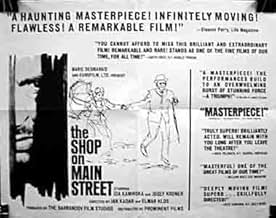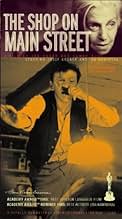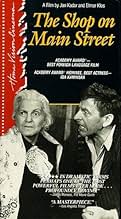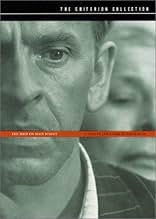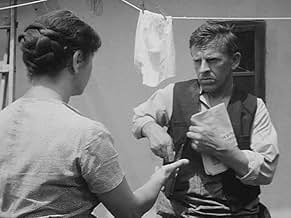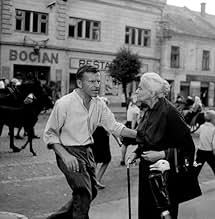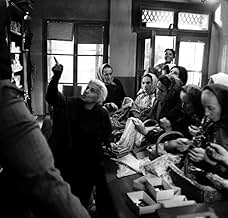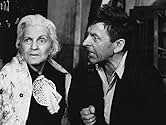PUNTUACIÓN EN IMDb
8,2/10
10 mil
TU PUNTUACIÓN
Añade un argumento en tu idiomaA carpenter in the Fascist Slovak State is appointed "Aryan controller" of a Jewish widow's store.A carpenter in the Fascist Slovak State is appointed "Aryan controller" of a Jewish widow's store.A carpenter in the Fascist Slovak State is appointed "Aryan controller" of a Jewish widow's store.
- Dirección
- Guión
- Reparto principal
- Ganó 1 premio Óscar
- 6 premios y 4 nominaciones en total
Ida Kaminska
- Rozalia Lautmannová
- (as Ida Kaminská)
Frantisek Zvarík
- Markus Kolkocký
- (as Frantisek Zvarík)
Ladislav Farkas
- Young Man
- (sin acreditar)
Luise Grossová
- Eliasová
- (sin acreditar)
Juraj Herz
- Jewish Man
- (sin acreditar)
Reseñas destacadas
This movie is one of my all-time favorites. It depicts a lazy, self-interested "everyman" caught up in a personal struggle of good and evil. The directors/writers question the moral responsibility of genocide, as smalltown Czechs under Nazi domination respond to their Jewish neighbors. Jews are no longer allowed to own shops, so their businesses' control and ultimate ownership is turned over to Christians -- namely, Nazi sympathizers. One such Christian, brother-in-law of a high-ranking official, is given a button shop, owned by a deaf, elderly Jewish woman, who is not even aware that there is a war going on. Due to her deafness, she has the innocence of a child. The Christian overseer finds that the shop makes no money whatsover, but also learns that the Jewish community supports the old woman and will pay him a salary to watch over her. What develops is a platonic love story between the two, hilariously funny due to the old woman's inability to comprehend the impending doom around her, and her assistant's struggle to shield her from harm while concerned with self-preservation. The movie works on numerous levels -- as a love story, including dreamlike fantasy elements of a bygone world where Nazi horrors don't exist; and as a tale of ultimate moral responsibility. It is a story of basically good people, who say nothing, see nothing, hear nothing, and do nothing when genocide threatens their neighbors, and who thus enable genocide to occur. The brilliant combination of hysterically funny scenes set against a background of impending mass murder brings this film to a life that is lacking in most humorless holocaust-oriented films. The laughter through tears produces an ultimate impact that is emotionally devastating. This film justly received an Oscar for Best Foreign Film when it was released. It was produced during a brief high point of the Czech film industry, prior to Russia's reconquering of the country and squelching any artistic freedom. All the performers are exceptional, particularly the two leads. (After the Russian takeover, actress Ida Kaminski emigrated to New York and attempted to revive the Yiddish Theatre.)
This film is one of the most gripping stories told about Nazi occupied Europe. A small town in 1942 Czechoslovakia feels the changing regime envelop the people, pinning friends against one another, and turning even the most pacifistic men into traitors. Small-time carpenter Tony is married to an attractive, but constantly nagging and complaining, materialistic woman. Seeing her in-laws successful, while exploiting the political advantages of working with the Nazis, makes Tony's wife ever more determined to have a "piece of the fortune" the Jews are said to have been hording. Although refusing to work at a "tower of Babel" the Nazis are erecting as a symbol of their glory (and doing without the money he could have earned), Tony doesn't speak out against the "new order" either.
When Tony finds himself as assistant to an old lady at her failing notions shop (which he "legally" was entitled to take over), he learns about the Jewish community, how everyone looked out for one another, and how these people were no different from other folk in town, if anything they were more human than the rest. Still afraid of retribution from the Nazis and their sympathisers, Tony is in a no-win-situation.
The final scene of this 1966 Best Foreign Film Oscar Winner was likely an inspiration for the final scene in the 1997 Blockbuster "Titanic". This cinematic gem serves as a reminder to the old German saying "Leben und leben lassen" (live and let live). A classic indeed!
When Tony finds himself as assistant to an old lady at her failing notions shop (which he "legally" was entitled to take over), he learns about the Jewish community, how everyone looked out for one another, and how these people were no different from other folk in town, if anything they were more human than the rest. Still afraid of retribution from the Nazis and their sympathisers, Tony is in a no-win-situation.
The final scene of this 1966 Best Foreign Film Oscar Winner was likely an inspiration for the final scene in the 1997 Blockbuster "Titanic". This cinematic gem serves as a reminder to the old German saying "Leben und leben lassen" (live and let live). A classic indeed!
10hh-10
This is one of the most elegantly crafted and powerful movies relating to the Holocaust that I have ever seen.
As the editor and publisher of the memoir of a Jewish Holocaust survivor from Slovakia, I can aver that this movie is achingly true to life. The film's setting could be this woman's hometown. Like Mrs. Lautmann in the movie, this woman had lived behind one of the family's shops on her hometown's Main Street and her family's properties were seized during the Aryanization depicted in this movie.
How the writer, director, and actors of this seemingly small film were able to condense and convey so much of the socio-economic and political tenor of that time and place, with such acumen, dark humor, and pathos is astounding.
It seamlessly moves toward an inexorable conclusion, with each successive scene leading the viewer deeper into the world of the two protagonists and reeling from the truths that the filmmakers expertly offer up.
It is days after viewing it, and still, I cannot shake this movie.
As the editor and publisher of the memoir of a Jewish Holocaust survivor from Slovakia, I can aver that this movie is achingly true to life. The film's setting could be this woman's hometown. Like Mrs. Lautmann in the movie, this woman had lived behind one of the family's shops on her hometown's Main Street and her family's properties were seized during the Aryanization depicted in this movie.
How the writer, director, and actors of this seemingly small film were able to condense and convey so much of the socio-economic and political tenor of that time and place, with such acumen, dark humor, and pathos is astounding.
It seamlessly moves toward an inexorable conclusion, with each successive scene leading the viewer deeper into the world of the two protagonists and reeling from the truths that the filmmakers expertly offer up.
It is days after viewing it, and still, I cannot shake this movie.
Objective aethetics can sometimes require background information in order to properly judge a piece of art. In the case of this film, it is essential to realize that the film was made under heavy communist censorship. Thus we have plenty of anti-fascist rhetoric as well as the heroic rebel character who abound in Marxist cinema. Yet behind this facade is a devastating critique of the ideology of terror which is the foundation of not only fascism, but the communism of 1960's Eastern Europe.
There's a whole tradition of political film forced to obscure themes enough to slide them past superficial censors and into the minds of a sometimes discerning audience. It can be done by simply universalizing the themes and parallelling the setting with something the audience could recognize. But Chaplin had explored a different method with The Great Dictator, by finding the similarities between two seemingly opposite figures. Through his critique of Hitler, he took on American pomposity and brutality. It is a particularly effective method as it allows the target no way out, turning its own accusations against itself.
Much has been said about the comedy and tragedy's coexistence in this film, and it is indeed an important facet. The simple reason being that life is both funny and tragic, thus to universalize the themes so that any person can be in the Brtko's place, it is imperative to represent both spheres of life.
But the theme is not limited to a broad contemplation on life in the universal sense. There is a much more devestating critique of all totalitarian ideologies. Brtko begins with a simple and, one could argue, natural sense of survival. He is pushed into greed by his wife, and is then pushed into desperation by the his state-sanctioned duty. He finally arrives into a complete state of terror caused by the irrationality of the events around him, and heightened by his relationship with Mrs. Lautmann. Of course, this kind of degradation could happen just as easily under a communist regime as in the days of the Nazis, and this was what the censors missed and the Academy Awards loved.
Few films have the social significance of this one. Not only for its powerful message, but the fact that it is a glimpse into a world we know little about.
5 out of 5 - Essential
There's a whole tradition of political film forced to obscure themes enough to slide them past superficial censors and into the minds of a sometimes discerning audience. It can be done by simply universalizing the themes and parallelling the setting with something the audience could recognize. But Chaplin had explored a different method with The Great Dictator, by finding the similarities between two seemingly opposite figures. Through his critique of Hitler, he took on American pomposity and brutality. It is a particularly effective method as it allows the target no way out, turning its own accusations against itself.
Much has been said about the comedy and tragedy's coexistence in this film, and it is indeed an important facet. The simple reason being that life is both funny and tragic, thus to universalize the themes so that any person can be in the Brtko's place, it is imperative to represent both spheres of life.
But the theme is not limited to a broad contemplation on life in the universal sense. There is a much more devestating critique of all totalitarian ideologies. Brtko begins with a simple and, one could argue, natural sense of survival. He is pushed into greed by his wife, and is then pushed into desperation by the his state-sanctioned duty. He finally arrives into a complete state of terror caused by the irrationality of the events around him, and heightened by his relationship with Mrs. Lautmann. Of course, this kind of degradation could happen just as easily under a communist regime as in the days of the Nazis, and this was what the censors missed and the Academy Awards loved.
Few films have the social significance of this one. Not only for its powerful message, but the fact that it is a glimpse into a world we know little about.
5 out of 5 - Essential
I gave this one a 10 because it is one of the most moving and engaging films about the Holocaust I have ever seen. The film is masterful in its depiction of the duplicitous nature of average citizens in Central Europe during the rise of Nazism. During World War II, the region was pulled between fascism and communism. This film is very revealing in its ability to show the true nature of totalitarianism and how it can effect the common person. The acting is brilliant, especially in the case of the old lady who is the owner of the shop. This is one of the best Czech films from the 60s, even better than Closely Watched Trains, which is also very good. This is the type of film that stays with you in that it is both haunting and thought provoking.
¿Sabías que...?
- CuriosidadesThis movie was shot exclusively in the small Slovak city of Sabinov.
- PifiasSet in 1942, a German troop train moves through the town. The train is carrying Soviet cold-war era trucks and anti aircraft guns that didn't exist until the 1950s. It's understandable for them to make this substitution since any authentic German equipment would have been scrapped long before.
- Citas
Jozef Katz: I don't understand anything any more. But I know one thing. When the law persecutes the innocent, that's the end of it. And those who make the law, too.
- ConexionesEdited into CzechMate: In Search of Jirí Menzel (2018)
- Banda sonoraÉn vagyok a falu rossza egyedül
(uncredited)
Written by Lajos Békésy, Imre Garsi and László Patak
Performed by Jozef Kroner, Frantisek Zvarík, Hana Slivková and Elena Zvaríková
Selecciones populares
Inicia sesión para calificar y añadir a tu lista para recibir recomendaciones personalizadas
- How long is The Shop on Main Street?Con tecnología de Alexa
- What is the historical background to the film?
Detalles
- Duración2 horas 8 minutos
- Color
- Mezcla de sonido
- Relación de aspecto
- 1.37 : 1
Contribuir a esta página
Sugerir un cambio o añadir el contenido que falta

Principal laguna de datos
By what name was La tienda en la calle Mayor (1965) officially released in India in English?
Responde

